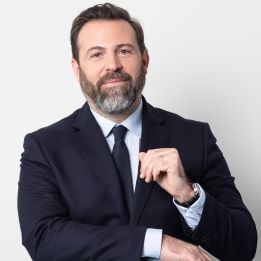
France 2023
Supported by the Association of Corporate Counsel



Senior legal manager, real estate and infrastructure, EMEA | EQUINIX

General counsel, reservoir performance division | Schlumberger

General counsel and senior vice president, corporate M&A | TotalEnergies

Executive vice president, legal affairs and internal audit | Bureau Veritas Group






Group general counsel, vice president legal, risks and compliance, company secretary | Colas Group


Group general secretary and general counsel | Expleo Group






General counsel and member of the management board in charge of legal, compliance, sustainability, and regulatory affairs | Natixis

General counsel and corporate secretary, member of the Airbus executive committee, chairman of Airbus UK | Airbus



Global head of competition law and general counsel, France | ArcelorMittal








Executive vice president legal, secretary of the board | Groupe SEB

Chief legal officer, secretary to the board of directors, member of the Renault Group’s leadership team | Renault Group

General counsel for EMEA, for IP/IT and global vendors | Ipsos





Group corporate social responsibility director and general counsel | Verallia


















Group general counsel | LVMH Moët Hennessy Louis Vuitton




Group general counsel and secretary of the advisory board | Groupe BPCE













Vice president legal - general counsel region Northern Europe | Saint-Gobain






Executive vice president and general counsel | Veolia Environnement

General counsel, Europe and global head of legal watch, regulatory and ESG | Crédit Agricole CIB


General corporate secretary and secretary of the board | Rexel



President of the AFJE (Association rançaise des Juristes d'Entreprises) | Association rançaise des Juristes d'Entreprises






















Vice president, group general counsel and company secretary | Dassault Systemes

Executive director legal and compliance, audits and risks, professional interaction excellence | Roche


On behalf of The Legal 500, I am truly delighted to introduce the GC Powerlist: France 2023. This edition celebrates the remarkable talents and achievements of France’s leading in-house counsel, and gives insight on the roles they play in contributing to the growth and development of the companies and industries in which they operate, while navigating unprecedented changes in the legal environment.
The second edition since the Covid-19 pandemic, this compilation explores how in-house legal professionals continue to adapt to and manage crises, especially in the face of other major events that have had global unprecedented impacts on regulatory environments, industries, and the very role of the legal function.
It also showcases the impressive cases and transactions spearheaded by these individuals, alongside their views on various phenomena impacting the legal sector, such as the evolving role of the general counsel, and the emergence of novel technologies that have transformed the work they do.
On this, Jean-Michel Orion, Radio France states, “[i]n the face of digital transformation, legal directors will have to continue to adapt to the rapid evolution of technology. This means managing the legal challenges associated with data protection, cybersecurity and the use of artificial intelligence in the legal field.”
According to, Maï Novello, group deputy chief legal and compliance officer at SCOR, they will need “[a]gility and versatility, as well as an appetite to push the boundaries of their traditional way of working in a fast-changing environment.”
As general counsel take on this challenge, they will be aided by the imminent acknowledgement and implementation of legal privilege, a welcome development that will no doubt, support advice issued by general counsel, and allow them to better secure the interests of their company.
In line with the seemingly endless crises the world has been experiencing, this edition contains various strategies these esteemed counsel employ to mitigate risks and protect their companies. While it is an unspoken rule to pre-empt and manage potential challenges, it is also equally (if not more) important to have a crisis management plan in place – especially one that all team members can follow cohesively.
Manuel Mesquita, head of legal corporate at Auchan Retail International says it best: “The worst thing that can happen in a time of crisis is when each member of the team takes isolated initiatives because actions may conflict and lead to an increase in workload.” Sharif Abousaada, group general counsel at Maurel & Prom adds, “I truly believe that we are stronger together and that it is important to leverage the experience and creativity of all members of the team in a crisis situation.”
Echoing the widely accepted view that the legal function should double as business partners, the approaches also include extensive engagements with stakeholders and business leaders, such as the CEO.
The interviews in this edition of The GC Powerlist: France 2023 also provide extensive views on widely popular trends that the legal industry is currently experiencing – contract automation, increased focus on ESG strategies – and how these highly skilled professionals are leveraging their roles in driving these developments and making positive contributions, while remaining conscious of operating within ethical, compliance and regulatory parameters.
We would like to congratulate and express our heartfelt thanks to everyone who featured in this edition, and graciously contributed their time and insights to make this year’s rundown on France’s elite in-house counsel a success.
Funke Olufon| Research Analyst The Legal 500 GC Powerlist Series
It has been a pleasure for Legal 500 to present the 2026 edition of the GC Powerlist: Germany in Frankfurt, celebrating the outstanding in-house professionals shaping this jurisdiction’s corporate legal landscape. The evening reception took place in the Restaurant Opéra, a beautiful location at the heart of country’s legal and financial hub.
This year’s reception welcomed the stemmed senior in-house counsel community in Germany, celebrating the blend of strategic authority, operational precision, technological adoption, and principled leadership that defines Germany’s in-house legal community today.
Carmen Godoy, lead editor of this third edition of the GC Powerlist: Germany 2026, welcomed everyone in the room. It was wonderful to see some familiar faces from previous editions and a pleasure to welcome those featuring in the GC Powerlist for the first time.
Following Godoy’s introduction, Mr Florian Weisner, managing partner at FPS Rechtsanwaltsgesellschaft, our hosts of the evening, addressed the audience with valuable remarks highlighting the value of the professional and personal exchange in the legal sector in Germany. He was followed on the stage by Dr Dierk Schindler, vice president of legal innovation and head of legal services global purchasing and logistics at Robert Bosch. Our keynote speaker of the evening focused on highlighting one of the hot topics of the in-house legal sphere worldwide: legal developments surrounding AI.
In her remarks, Godoy unveiled the findings of this year’s research into Germany’s in-house legal market. From ensuring legal is decisively embedded in strategy, to integrating AI in the legal teams’ daily practice and operating under geopolitical and regulatory pressure. Germany’s general counsel are leading with transparency, accountability, and a clear sense of responsibility.
The GCs, CLOs, heads of legal and other senior in-house counsel in the room had many achievements to celebrate.
On behalf of the entire Legal 500 team, we extend our warmest congratulations to everyone included in this 2026 edition of the GC Powerlist: Germany.
We would also like to take this opportunity to express our sincere gratitude FPS Rechtsanwaltsgesellschaft for joining us in recognising the exceptional talent driving progress across Germany’s in-house legal profession.